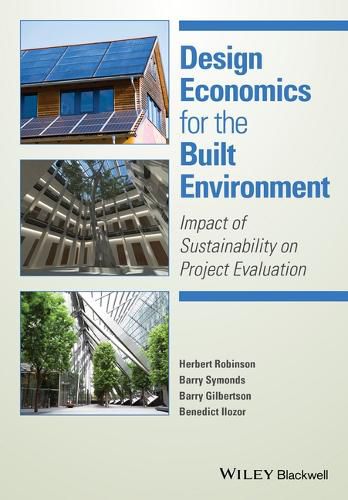Readings Newsletter
Become a Readings Member to make your shopping experience even easier.
Sign in or sign up for free!
You’re not far away from qualifying for FREE standard shipping within Australia
You’ve qualified for FREE standard shipping within Australia
The cart is loading…






The drive towards environmentally friendly buildings and infrastructure has led to a growing interest in providing design solutions underpinned by the core principles of sustainability to balance economic, social and environmental factors.
Design Economics for the Built Environment: Impact of sustainability on project evaluation presents new directions, reflecting the need to recognise the impact of climate change and the importance of sustainability in project evaluation. The aim is to provide a new approach to understanding design economics in the context of the changing policy environment, legislative and regulatory framework, and increasing economic, environmental and social pressure as result of the sustainability agenda.
The book follows a structured approach from theories and principles in the earlier chapters, to the practical applications and emerging techniques focusing on value and social, economic and environmental considerations in making design decisions. It starts with the policy context, building on various theories and principles such as, capital cost, value of design and resource-based theories, the new rules of measurement (NRM) to explore cost planning, the relationship between height and costs, key socio-economic and environmental variables for design appraisal, eco-cost/value ratio (EVR), whole life theory and the treatment of carbon emission as external costs, productivity and efficiency, fiscal drivers and legal framework for carbon reduction, procurement and allocation of risks in contracts.
Case studies, practical examples and frameworks throughout reinforce theories and principles and relate them to current practice. The book is essential reading for postgraduate students in architecture, building and quantity surveying and is also a valuable resource for academics, consultants and policy-makers in the built environment.
$9.00 standard shipping within Australia
FREE standard shipping within Australia for orders over $100.00
Express & International shipping calculated at checkout
The drive towards environmentally friendly buildings and infrastructure has led to a growing interest in providing design solutions underpinned by the core principles of sustainability to balance economic, social and environmental factors.
Design Economics for the Built Environment: Impact of sustainability on project evaluation presents new directions, reflecting the need to recognise the impact of climate change and the importance of sustainability in project evaluation. The aim is to provide a new approach to understanding design economics in the context of the changing policy environment, legislative and regulatory framework, and increasing economic, environmental and social pressure as result of the sustainability agenda.
The book follows a structured approach from theories and principles in the earlier chapters, to the practical applications and emerging techniques focusing on value and social, economic and environmental considerations in making design decisions. It starts with the policy context, building on various theories and principles such as, capital cost, value of design and resource-based theories, the new rules of measurement (NRM) to explore cost planning, the relationship between height and costs, key socio-economic and environmental variables for design appraisal, eco-cost/value ratio (EVR), whole life theory and the treatment of carbon emission as external costs, productivity and efficiency, fiscal drivers and legal framework for carbon reduction, procurement and allocation of risks in contracts.
Case studies, practical examples and frameworks throughout reinforce theories and principles and relate them to current practice. The book is essential reading for postgraduate students in architecture, building and quantity surveying and is also a valuable resource for academics, consultants and policy-makers in the built environment.